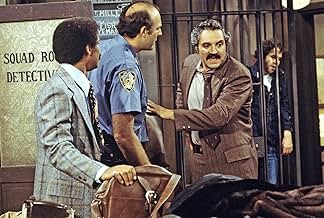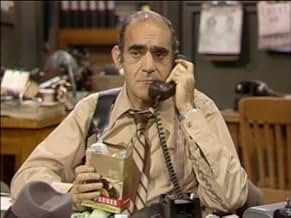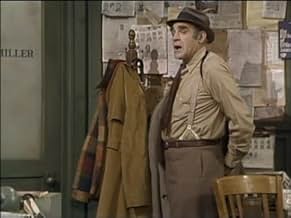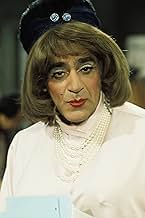El capitán del distrito 12 de la policía de Nueva York y su personal gestionan los diversos problemas locales y personajes que entran en la comisaría.El capitán del distrito 12 de la policía de Nueva York y su personal gestionan los diversos problemas locales y personajes que entran en la comisaría.El capitán del distrito 12 de la policía de Nueva York y su personal gestionan los diversos problemas locales y personajes que entran en la comisaría.
- Ganó 3 premios Primetime Emmy
- 9 premios ganados y 43 nominaciones en total
Explorar episodios
Opiniones destacadas
I am a fairly young person and I was very pleased to find such a wonderful show on DVD. The title of the show through me off, but after reading a bit about the show I was intrigued and bought it.
At first the show mainly focuses on the situations and what the cops are doing, but after a while the show starts to focus only on the squad-room where the detectives convene.
Barney Miller is always getting into other peoples business. When a criminal comes in he Interrogates them and tries to get the whole story out of them and also tries to put his own opinion or label on it.
Most of the stories are very light-hearted, but some do hit close to home. The show is funny, comical, and well played, but some episodes do have a serious vibe at the end of them.
By season three the cast is permanent and the show gets its real humor on. Each detective has an impressive amount of character depth. It was interesting to learn about each of them as I watched all of the episodes. By the end, I felt as if I knew each of them personally.
The only parts of the show I didn't like was Lt. Scanlon. His character was played so well, I truly didn't like him. Inspector Luger was played by a veteran actor, but his character seemed a little dim-witted. By the end of the series, the only set you would see is the squad room. After having visited a couple different stage sets (for example: Barnies apartment, Fish's apartment and the hide-out apartment) it seemed very confining to only use the squad room in the later seasons.
The exits of Fish and Yemada were torture on the show. Fish was great when it came to quick and ironic humor while nick tried to do the same, but his character was never truly replaced.
Overall, I love this show and I continue to watch it often. The humor, the stories, the backgrounds of the people are all interesting and entertaining. This show is recommended for all who love comedy and also recommended for all who wish to enjoy a simple show.
At first the show mainly focuses on the situations and what the cops are doing, but after a while the show starts to focus only on the squad-room where the detectives convene.
Barney Miller is always getting into other peoples business. When a criminal comes in he Interrogates them and tries to get the whole story out of them and also tries to put his own opinion or label on it.
Most of the stories are very light-hearted, but some do hit close to home. The show is funny, comical, and well played, but some episodes do have a serious vibe at the end of them.
By season three the cast is permanent and the show gets its real humor on. Each detective has an impressive amount of character depth. It was interesting to learn about each of them as I watched all of the episodes. By the end, I felt as if I knew each of them personally.
The only parts of the show I didn't like was Lt. Scanlon. His character was played so well, I truly didn't like him. Inspector Luger was played by a veteran actor, but his character seemed a little dim-witted. By the end of the series, the only set you would see is the squad room. After having visited a couple different stage sets (for example: Barnies apartment, Fish's apartment and the hide-out apartment) it seemed very confining to only use the squad room in the later seasons.
The exits of Fish and Yemada were torture on the show. Fish was great when it came to quick and ironic humor while nick tried to do the same, but his character was never truly replaced.
Overall, I love this show and I continue to watch it often. The humor, the stories, the backgrounds of the people are all interesting and entertaining. This show is recommended for all who love comedy and also recommended for all who wish to enjoy a simple show.
This show was one of the reasons why the ABC would dethrone the CBS, as the number one network in prime time in the latter 1970's.
Barney Miller depicted the day to day workings of a typical New York City detectives unit. Void of overly melodramatic urban drama, and the now all too over played "tough guy" act, Barney Miller was touted as being a fair portrayal of the life of a detective (with much more levity of-course).
Even though it was first and foremost a comedy series, the writers gave us a much needed balance by injecting a bit of drama into the plot and characters themselves. This dramatic element was so well done, that it added to character development, and provided for more laughter. Their witty dialog rarely left the viewer disappointed, or without a laugh, and with entertainment being the key factor of any Television production, the cast of Barney Miller delivered in episode after episode.
However, the show was produced during a time when crime in NY City was being managed with a overly diplomatic approach. An experiment that would prove it self to be disastrous, effectuated lectures by some of the shows characters, demonstrating an endorsement of this new more "liberal" approach to fighting crime.
There is not much out there today that even comes close to what we had in Barney Miller. It seems that todays Television lacks respect for their audience, as cheap sexual gags, and one liners dominate the sitcom landscape, and leave us with vacuous and cloddish jocularity.
Barney Miller will however, be an example of what Television once was. A time when mature, plot driven humor was demanded, and the crude and immature was rejected.
Barney Miller depicted the day to day workings of a typical New York City detectives unit. Void of overly melodramatic urban drama, and the now all too over played "tough guy" act, Barney Miller was touted as being a fair portrayal of the life of a detective (with much more levity of-course).
Even though it was first and foremost a comedy series, the writers gave us a much needed balance by injecting a bit of drama into the plot and characters themselves. This dramatic element was so well done, that it added to character development, and provided for more laughter. Their witty dialog rarely left the viewer disappointed, or without a laugh, and with entertainment being the key factor of any Television production, the cast of Barney Miller delivered in episode after episode.
However, the show was produced during a time when crime in NY City was being managed with a overly diplomatic approach. An experiment that would prove it self to be disastrous, effectuated lectures by some of the shows characters, demonstrating an endorsement of this new more "liberal" approach to fighting crime.
There is not much out there today that even comes close to what we had in Barney Miller. It seems that todays Television lacks respect for their audience, as cheap sexual gags, and one liners dominate the sitcom landscape, and leave us with vacuous and cloddish jocularity.
Barney Miller will however, be an example of what Television once was. A time when mature, plot driven humor was demanded, and the crude and immature was rejected.
"Barney Miller" showed the gritty realism of police work in New York City in the 1970s, albeit with humor. Skits about the impending bankruptcy of the city, some of the futile criminal behavior (man stuck inside ductwork trying to burglarize a store), the mundane day in, day out existence of police officers with the occasional heart-pounding, adrenalin rush of excitement, and of course, what we in the profession called "the hairbags" - the old cops, forever full of stories, content to live in the past as Inspector Lugar exemplifies. To those who say "Barney Miller" is dated, I say the show is a timeless slice of life, and can be set in almost any locale and time period. The cast could not have been picked with any more brilliance, and the production was seamless. I say "Barney Miller" is a classic for the generations.
This is one of the absolute greatest shows on television - never fails to entertain. Too bad the "suits" didn't catch on and try to copy what so obviously worked. It ranks right there with M*A*S*H, Frasier, Cheers, and Married...With Children as examples of how good comedy can be...
If there was a great TV show that emphasize the decade of the 1970's,the situation comedy series "Barney Miller",was just that. This was a quality series that became one of television's greats. In perspectives,"Barney Miller" was a show that changed dramatically during the course of its seven year run,despite the fact that its plot,setting and basic cast remained the same. This was a show that quickly became one of the biggest hits for the ABC-TV network,producing 170 episodes during its seven year run on the network from the premiere episode on January 23,1975 until the final episode of the series on May 20,1982. The series was created by Danny Arnold,who served as the executive producer along with Theodore J. Flicker. Arnold also served as one of the writers of the show along with Chris Hayward. The series was produced by Arnold's production company Four D Productions in association with the ABC Television Network(the series was filmed in front of a studio audience at ABC Television Center in Hollywood).
The show was about a detective squad at a precinct house in New York City's Greenwich Village,and often the strange people from the community went in and out their door each week. At the beginning of the series,the pace of the police department was fast and the comedy a bit loud.,and the emphasis was one-on-one liners and quirkiness rather than on real characters. Captain Barney Miller(Hal Linden)was head of the precinct,very put-upon and overworked,but nevertheless always wise and friendly. Wojo(Max Gail)was the well meaning detective who was a bit lacking in smarts. Harris(Ron Glass)was funny,fashion-conscious,and cool,while Yemana(Jack Soo)was much more introverted,though he also would provide the occasional witty commentary. Fish(Abe Vigoda,who was on the show for two seasons before being spun off into their own show "Fish")was the elder statesmen,the old man on the verge of retirement who had more ailments than you could imagine. Chano(Gregory Sierra)was the normal of the bunch after Barney,and always tried to have a positive outlook despite being constantly exposed to the less inspiring side of life. Other characters that appeared were Barney's wife Liz(Barbara Barrie),Barney's supervisor Chief Inspector Frank Luger(James Gregory),and Officer Carl Levitt(Ron Carey),and Detective Arthur Dietrich(Steve Landesberg).
The detectives were racially mixed,which,at the show's inception,would occasionally provide for some comedy. Other detectives came and went after an episode or two,especially during the very early years of the series. Its amazing that "Barney Miller" survived,but it laid the groundwork for what was great comedy and the awards that this show received: It won the DGA Award from the Directors Guild of America in 1981,and it won back-to-back Emmys for Outstanding Comedy Series and Outstanding Actor in a Comedy Series(Hal Linden)in 1979,1980,and 1982. Not to mention winning the Peabody Award in 1979,and the Golden Globe for Best Television Comedy or Musical Series twice in 1976 and 1977.
Almost all of the action took place in the squad room and Barney's adjoining office,despite the fact that the station seemed very small considering its location. "Barney Miller" during the seven seasons that it ran on ABC,became a literate,well-written show with interesting characters and story lines mixed in with some grand comedy. In its later years it unfortunately suffered from "social-cause-of-the-week",syndrome by way of a'la' Lou Grant and every other socially conscious show that exploded onto TV screens in the mid-1970's and early 1980's. This was a series that is highly recommended as one of the best to come out of the 1970's and survived until its demise in the early 1980's.
The show was about a detective squad at a precinct house in New York City's Greenwich Village,and often the strange people from the community went in and out their door each week. At the beginning of the series,the pace of the police department was fast and the comedy a bit loud.,and the emphasis was one-on-one liners and quirkiness rather than on real characters. Captain Barney Miller(Hal Linden)was head of the precinct,very put-upon and overworked,but nevertheless always wise and friendly. Wojo(Max Gail)was the well meaning detective who was a bit lacking in smarts. Harris(Ron Glass)was funny,fashion-conscious,and cool,while Yemana(Jack Soo)was much more introverted,though he also would provide the occasional witty commentary. Fish(Abe Vigoda,who was on the show for two seasons before being spun off into their own show "Fish")was the elder statesmen,the old man on the verge of retirement who had more ailments than you could imagine. Chano(Gregory Sierra)was the normal of the bunch after Barney,and always tried to have a positive outlook despite being constantly exposed to the less inspiring side of life. Other characters that appeared were Barney's wife Liz(Barbara Barrie),Barney's supervisor Chief Inspector Frank Luger(James Gregory),and Officer Carl Levitt(Ron Carey),and Detective Arthur Dietrich(Steve Landesberg).
The detectives were racially mixed,which,at the show's inception,would occasionally provide for some comedy. Other detectives came and went after an episode or two,especially during the very early years of the series. Its amazing that "Barney Miller" survived,but it laid the groundwork for what was great comedy and the awards that this show received: It won the DGA Award from the Directors Guild of America in 1981,and it won back-to-back Emmys for Outstanding Comedy Series and Outstanding Actor in a Comedy Series(Hal Linden)in 1979,1980,and 1982. Not to mention winning the Peabody Award in 1979,and the Golden Globe for Best Television Comedy or Musical Series twice in 1976 and 1977.
Almost all of the action took place in the squad room and Barney's adjoining office,despite the fact that the station seemed very small considering its location. "Barney Miller" during the seven seasons that it ran on ABC,became a literate,well-written show with interesting characters and story lines mixed in with some grand comedy. In its later years it unfortunately suffered from "social-cause-of-the-week",syndrome by way of a'la' Lou Grant and every other socially conscious show that exploded onto TV screens in the mid-1970's and early 1980's. This was a series that is highly recommended as one of the best to come out of the 1970's and survived until its demise in the early 1980's.
¿Sabías que…?
- TriviaDuring its broadcast run, amid the many cop shows on television at the time, many real-life police officers considered this the show that best depicted the realities of police life.
- ErroresDetective Fish has inconsistent years of service with the department. In the season one episode "The Arsonist " he mentions being on the force for 25 years. In the same seasons episode "Fish" he remarks that he went to the academy in 1937, making him a 38 year veteran.
- Citas
Yemana: Then Fish runs in the alley and he leaps over us like one of those, what do you call those things in Africa that run and leap in the air?
Detective Ron Harris: Slaves.
- Créditos curiososAt different times in the production of the series Max Gail was credited as both Max Gail and Maxwell Gail.
- ConexionesFeatured in The 28th Annual Primetime Emmy Awards (1976)
Selecciones populares
Inicia sesión para calificar y agrega a la lista de videos para obtener recomendaciones personalizadas
- How many seasons does Barney Miller have?Con tecnología de Alexa
Detalles
- Fecha de lanzamiento
- País de origen
- Idioma
- También se conoce como
- The Life and Times of Captain Barney Miller
- Locaciones de filmación
- Productora
- Ver más créditos de la compañía en IMDbPro
- Tiempo de ejecución
- 30min
- Color
Contribuir a esta página
Sugiere una edición o agrega el contenido que falta































